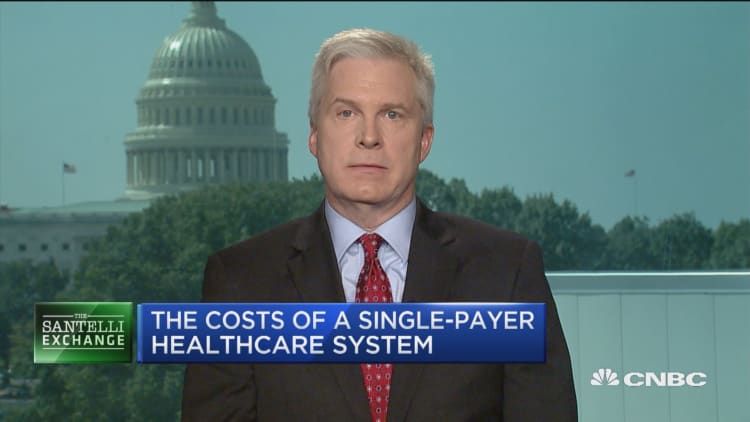Americans say they want better health care. How that will happen is still up in the air.
Enter Medicare for All, a term that increasingly is being used by health-care advocates, politicians and aspiring presidential candidates.
The concept is the latest iteration of a complex discussion about medicine that goes back decades. The current goal: To come up with something better than the Affordable Care Act when it comes to giving more individuals access to care and reducing what they pay, while putting fewer burdens on medical industry.
The debate comes as more Americans worry about health-care issues. A recent poll from the Pew Research Center found that health care ranks as a top public concern, second only to the economy. Terrorism came in third.
The number of Americans who say reducing health-care costs should be a top priority for the president and Congress has increased steadily, according to Pew's survey. Eight years ago, 61 percent cited those concerns, while today that has risen to 69 percent.
And a majority of Americans are in favor of expanding public health coverage, according to a separate survey from the Henry J. Kaiser Family Foundation.
Of the adults polled by Kaiser, 77 percent said they would support allowing people ages 50 to 64 to buy health insurance through Medicare.
Seventy-five percent said those who do not have health insurance through their employer should be able to purchase insurance through their state's Medicaid program.
In addition, 74 percent of respondents said yes to a national government-administered health plan that would be open to anyone.
A smaller majority — 56 percent — said they support a national plan often known as Medicare for All, or a single government plan through which all Americans would get their insurance.

"The more gradual approaches have higher levels of support and, particularly among Republicans, those ideas are more palatable than a switch to a single government plan," said Liz Hamel, director of public opinion and survey research at the Kaiser Foundation.
Americans generally like the fact that these plans would guarantee health insurance, eliminate premiums and reduce out-of-pocket costs, Hamel said.
What some don't like, however, are the possibilities that a Medicare for All-type plan could eliminate private health insurance companies or the existing Medicare program and increase taxes, according to Hamel.
"People want to be able to keep what they have if they like it," she said.
Unanswered questions
Medicare for All offers a different idea at a time when many feel that the Affordable Care Act failed to provide universal health-care coverage, according to Dr. Steffie Woolhandler, a co-founder of Physicians for a National Health Program.
As debate around the concept grows, more Medicare for All-type proposals are emerging with similar names: Medicare for America, Medicare Extra for All, Medicare Advantage for All, to name a few, according to Woolhandler.
"They sound a little like Medicare for All," Woolhandler said. "But they don't mean the same thing as the three English language words Medicare for All."
Woolhandler cited a bill sponsored by Sen. Bernie Sanders of Vermont as an example of Medicare for All. That legislation advocates a single-payer plan that will cover everyone in one nonprofit public system. A separate Medicare for All-type bill also has been introduced in the House of Representatives.
Woolhandler said she sees a new system as a way of eliminating the frustrations she encounters as a primary care physician practicing in the South Bronx in New York City. Often, the treatments or medications patients need are not available to them because of their insurance, she said.
Under a Medicare for All system, health care in America would look a lot like it does in Canada, where all patients can see a doctor and generally do not have to pay a bill. Canada also spends about half what the U.S. does on health care on a per-capita basis, Woolhandler said.
"The evidence is fairly strong that, over the long run, you save a lot of money with single payer," Woolhandler said.
Some health-care experts are not sold on the Medicare for All idea.
More from Personal Finance:
If you want switch to a different Medicare Advantage Plan, you get a 'do-over'
This teacher wound up with a $108,951 medical bill. When to battle your insurer
Here's why the stakes are higher for women when claiming Social Security
Katy Votava, president of Goodcare.com and a Medicare expert, cautions against using the word Medicare to describe a public single-payer system.
That is because most of the current Medicare system is actually private insurance, though it is regulated by the government, Votava said. And the coverage people get from Medicare typically comes after they have paid into that system for 40 or 50 years.
Once they are covered by Medicare, patients are often confronted by high costs and confusing rules, Votava said.
"We can provide more reasonable health insurance for all and health services for all," Votava said. "I know we can.
"But it involves breaking down some old ways."


